| 1 March |
• yesterday • tomorrow |
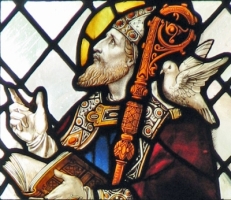
• David the Briton
• David of Menevia
• David del Galles
• Degui, Dewi, Dewid, Dewm, Dewn, Dmui
Born to the Welsh royalty, the son of King Sandde, Prince of Powys, and of Saint Non, the daughter of a chieftain of Menevia (western Wales). Grandson of Ceredig, Prince of Cardigan. Uncle of King Arthur. Priest. Studied under Saint Paul Aurelian. Worked with Saint Columbanus, Saint Gildas the Wise, and Saint Finnigan. Missionary and founder of monasteries.
Following his contribution to the synod of Brevi in Cardiganshire, he was chosen primate of the Cambrian Church. Archbishop of Caerleon on Usk, he moved the see to Menevia. Presided at the Synod of Brefi which condemned the Pelagian heresy. Encouraged and founded monasteries. First to build a chancel to Saint Joseph of Arimathea's wattle church at Glastonbury.
After a vision in his monastery in the Rhos Valley, he set out next day with two monks to Jerusalem to aid the Patriarch. While there his preaching converted anti-Christians. Legend says that once while he was preaching, a dove descended to his shoulder to show he had the blessings of the Spirit, and that the earth rose to lift him high above the people so that he could be heard by them all. Another time when was preaching to a crowd at Llandewi Brefi, people on the outer edges could not hear, so he spread a handkerchief on the ground, stood on it, and the ground beneath rose up in a pillar so all could hear.
c.542 at Menevia (now Saint David's), Wales
• c.601 at Mynyw, Wales of natural causes
• interred in Saint David's Cathedral, Pembrokeshire, Wales
1120 by Pope Callistus II
• doves
• Wales
• preaching on a hill
• dove
• Celtic bishop with long hair, a beard, and a dove perched on his shoulder
• holding his cathedral
• leek
• man standing on a mound with a dove on his shoulder
• medals and pendants
• books, clothing and rosaries
Lord, raise me up after Thee! - Saint David of Wales
https://catholicsaints.info/saint-david-of-wales/
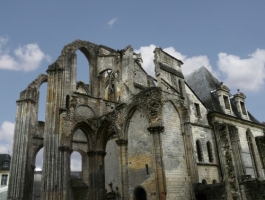
• Abbey of Saint Wandrille
• Fontenelle Abbey
657
Benedictine monastery in Normandy (Seine-Inférieure), near Caudebec-en-Caux, founded by Saint Wandrille. The basilica he erected was consecrated in 657, and was subsequently destroyed and rebuilt several times. After its destruction by Danish pirates in 862, the community moved to other centers. Fontenelle was restored in 966.
Fervor and learning characterized the monks, and many privileges were granted to them. The monastery was famed for its library and school, where calligraphy in particular, as well as letters, sciences, and the fine arts, were cultivated. The introduction of commendatory abbots in the 16th century lessened the prosperity of the abbey, but it enjoyed some of its earlier prestige when taken over by the Maurists in 1636.
The abbey was suppressed in 1791, and then sold the following year. From 1893 to 1901 it was held by the French Benedictines. The chapel of Saint Saturnin, also erected by Saint Wandrille, overlooks the abbey. It is one of the oldest ecclesiastical buildings in existence.
The commemoration on 1 March celebrates the founding and history of the abbey, and all the holy monks who have lived there, especially those who have been canonized or beatified.
• Blessed Milo of Fontenelle
• Saint Ansbert of Rouen
• Saint Ansegisus
• Saint Bagne of Terouanne
• Saint Benignus of Flay
• Saint Condedus
• Saint Erembert of Toulouse
• Saint Fulk of Fontenelle
• Saint Genesius of Lyon
• Saint Gennard
• Saint Gerold of Evreux
• Saint Godo of Oye
• Saint Hermenland
• Saint Hugh of Rouen
• Saint Lambert of Lyon
• Saint Walter of Fontenelle
• Saint Wandrille of Fontenelle
https://catholicsaints.info/abbey-of-fontenelle/
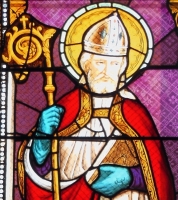
Aubin
Born to a noble family of Brittany. Pious child. Monk from his mid-20's into his 60's at Timcillac, which later renamed itself Saint Aubin's in his honour. Abbot for 25 years, beginning in 504. Bishop of the diocese of Angers, France from c.529. His episcopacy was known for his charity to the poor, widows and orphans, for his ransoming of slaves from their owners, his personal holiness, and the miracles he worked.
Custom of the day permitted consanguinary marriage. Albinus decried this as incest, and fought against it, making enemies in many powerful families who practiced it. He called councils at Orleans in 538 and 541, both of which condemned this and other morals offenses.
Legend says that when he visited Etheria, a woman imprisoned by King Childebert for bad debts, the woman threw herself at Albinus' feet, and pled for help. A guard made a move to strike her, but Albinus breathed in the man's face, and he fell dead. Etheria was soon released.
Another time Augin passed a prison tower in Angers, and heard the cries and moans of badly treated prisoners. He pled with the local magistrate for their release, but was refused. He returned to the tower and prayed in front of it; after several hours, a landslide brought down part of the tower, the prisoners escaped, followed Albinus to the church of Saint Maurichies, reformed their ways, and became model citizens and Christians.
The abbey of Saint Aubin in Angers was erected in his memory.
469 at Vannes, Brittany, France
• 1 March 549 of natural causes
• relics at the Cathedral of Saint Germanus in Paris, France
• sick children
• against blindness
• against pertussis or whooping cough
• against pirate attacks
• Saint-Aubin, Belgium
https://catholicsaints.info/saint-albinus-of-angers/
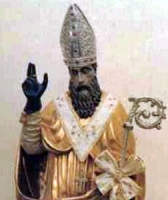
• Leo Lukas
• Leo Luke
• Leoluca
• Leone Luca
• Leo Luke of Corleone
• Luke of Sicily
Born to a wealthy and pious family who raised cattle and sheep. Orphaned at an early age he devoted himself to managing the estate and supervising the herds. In the solitude of the fields he realized he had a call to religious life. He sold his estate, converted his assets to cash, gave the money to the poor, and became a Basilian monk at the San Filippo d' Agira monastery in the province of Enna, Sicily. He moved from Sicily to Calabria, Italy to escape the persecutions of invading Muslims, and joined a monastic community there. Pilgrim to Rome, Italy where he made a special point to visit the tombs of Saint Peter and Saint Paul. Abbot of a Basilian monastery of Corleone, Sicily. Lived 80 years as a monk. Leolucas' intervention is credited with saving the city of Corleone during the plague outbreak of 1575. The apparition of Leolucas and Saint Anthony prevented a Bourbon invasion of Corleone on 27 May 1860.
c.815 to 818 at Corleone, Sicily
• c.915 of natural causes
• miracles reported at his tomb
• Corleone, Sicily
• Vibo Valentia, Italy
https://catholicsaints.info/saint-leolucas-of-corleone/
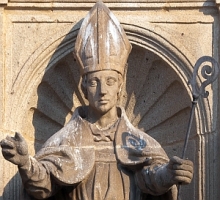
Rosendo, Rudesinde, Rudesindo, Rudesindus
Born to the Spanish nobility, son of Count Gutierre de Mendenez. Relative of Saint Senorina. Benedictine monk. Reluctant bishop of Mondonedo, Spain at age 18. Reforming bishop of Compostela, Spain replacing his corrupt cousin Sisnand. Led armies against invading Norsemen and Moors. When Sisnand escaped prison, he attacked Rudesind during Christmas Mass, and threatened to murder him. Rather than live as a prisoner himself, Rudesind retired from the bishopric. He founded several monasteries and abbeys, all under strict Benedictine Rule, including Saint John of Caaveiro Abbey and the Monastery of San Salvador de Celanova; he lived as a humble monk at each of these. Abbot of San Salvador de Celanova. Advisor to Church and political leaders. Reported miracle worker.
Legend says that during prayers at the church San Salvador on Mount Coruba, his mother received the knowledge that her son would be a holy man. She insisted that the boy be baptized at the church. It had no font, so one was loaded into a cart and hauled up the mountain. Halfway up the cart broke down - so the font continued up the hill under its own power.
26 November 907 in Galicia, Spain
1 March 977 at Celanova, Spain of natural causes
1195 by Pope Celestine III
https://catholicsaints.info/saint-rudesind/

• Jane Mary Bonomo
• Jeanne-Marie Bonomo
Eldest of four children of Giovanni Bonomo, a wealthy merchant, and Virginia Ceschi di Santa Croce. Legend says that she began to speak at age 10 months – and her first words were to talk her father out of some sinful act he was considering; by age 5 she could speak Latin without having had lessons. Her mother died when Giovanna was 6 years old. Educated by the Poor Clares of Trent, Italy from age 9. Benedictine nun at Bassano, Italy, making her vows on 8 September 1622, and taking the name Maria Giovanna; she fell into ecstasy for the first time during the ceremony of her profession. Received the stigmata at age 20. Novice mistress. Chosen prioress of her house, and abbess three times. Bitterly persecuted by members of her own community for her dedication and mystical experiences; many thought them either heretical or a play for attention.
15 August 1606 at her family’s country estate outside Asiago, diocese of Vicenza, Italy
1 March 1670 of natural causes
9 June 1783 by Pope Pius VI
https://catholicsaints.info/blessed-giovanna-maria-bonomo/
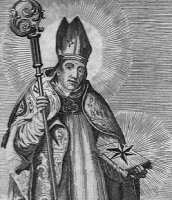
• Apostle of the Bructeri
• Apostle of the Frisians
• Swithbert the Elder
• Swithbert of Kaiserswerth
• Suidbert, Suitbert, Suitberto, Suitbertus, Swibert, Swidbert
Sunday after 29 June (translation of relics)
Studied in Ireland with Saint Egbert of Rathemigisi. Benedictine monk. Preacher. Spiritual teacher of Saint Willeic. One of a group of twelve English missionaries led by Saint Willibrord of Echternach who worked in Friesland, a group of islands off the coast of the Netherlands, evangelizing the Frisians and Bructeri. Bishop in 693. Worked with Saint Wilfrid of York. Founded a Benedictine monastery at Werth on the Rhine (modern Düsseldorf-Kaiserswerth, Germany) where he lived the rest of his life under the direction of his co-worker missionary, Saint Velleicus who served as the abbot.
c.647
• 1 March 713 near Düsseldorf-Kaiserswerth, Germany of natural causes
• relics at monastery he founded at Werth, Germany
• against angina
• against throat ailments
• angina sufferers
• Drevenack, Germany
• Germany
https://catholicsaints.info/saint-swithbert/
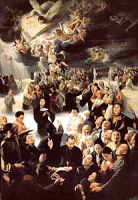
• Agnese Cao Kuiying
• Agnes Tsao Kou Ying
• Agnes Kouying Tsao
• Agnes Tsao-kouy
• Inés, Yiani
28 September (as one of the Martyrs of China)
Raised in a Catholic family, Agnes was a teenager when her parents died, and she moved from her home village to Xingyi. Married to a young farmer at age 18. Widowed two years later when her husband was martyred, she devoted herself to teaching catechism. At the request of Saint, Auguste Chapedelaine, she moved to the Guangxi province to help with the missionary work there. Along with teaching the catechism, she taught young women to cook, care for children and manage a home. For her work with the missionaries, she was imprisoned and tortured, then locked in a tiny cage and given a chance to save herself by renouncing her faith; she refused. Martyr.
c.1821 in Wujiazhai, Guizhou, China
1 March 1856 in Xilin, Guangxi, China of abuse, exposure and starvation
1 October 2000 by Pope John Paul II
https://catholicsaints.info/saint-agnes-cao-guiying/
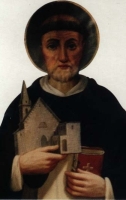
7 March (Franciscans)
Nothing is known of the early life of Blessed Christopher. He joined the Dominican at San Eustorgio convent, Milan, Italy, and became a travelling preacher throughout Italy. Abbot at Our Lady of Mercy abbey in Taggai, Italy. He had the gift of prophecy, foreseeing plague, flood and invasion by Turks. Wrote four works on sermon preparation; the citations in them indicate extensive study of the early Church Fathers.
1410 in Milan, Italy
1484 at Our Lady of Mercy convent, Taggia, Italy of natural causes
1875 by Pope Pius IX (cultus confirmed)
God of all truth, you made Blessed Christopher a faithful herald of your word to the people. By his life and ministry may we keep Christ ever in our thoughts and in the love of our hearts, for he lives and reigns with you and the Holy Spirit, one God, for ever and ever. - General Calendar of the Order of Preachers
https://catholicsaints.info/blessed-christopher-of-milan/
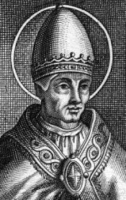
Born to a Roman senatorial family. Great-grandfather of Pope Saint Gregory the Great. Married, father, and widower. Priest. Nothing else is known of his early life. Elected 48th pope.
At the time of his ascension the Eastern Church had been split by the Act of Union of Emperor Zeno, which tried but failed reconcile the Church and Eutychianism. Felix excommunicated the schismatic bishops and paved the way for re-union in 518, during the reign of Justinian. He drew up the conditions for the return of African Christians who had apostatized during the Vandal persecutions.
at Rome, Italy
13 March 483
• 1 March 492 at Rome, Italy of natural causes
• buried in Saint Paul's on the Ostian Way
https://catholicsaints.info/pope-saint-felix-iii/
Jered, Yard
Old Testament patriarch. Member of the fifth generation following Adam and Eve. Father of Enoch. Lived to age 962.
the descendant; the inheritor (hebrew)
When Mahalalel was sixty-five years old, he became the father of Jared. Mahalalel lived eight hundred and thirty years after the birth of Jared, and he had other sons and daughters. The whole lifetime of Mahalalel was eight hundred and ninety-five years; then he died. When Jared was one hundred and sixty-two years old, he became the father of Enoch. Jared lived eight hundred years after the birth of Enoch, and he had other sons and daughters. The whole lifetime of Jared was nine hundred and sixty-two years; then he died. - Genesis 5:15-20, New American Bible
https://catholicsaints.info/jared-the-patriarch/
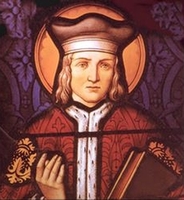
• Roger de Beaufort
• Roger de Ternes
• Roger le Fort
• Roger of Bourges
French noble, the son of Godefroy le Fort, the lord of Ternes, Limousin. Nephew of Cardinal de la Chapelle. Bishop of Orleans, France in 1321 while still a sub-deacon. Bishop of Limoges, France in 1328. Bishop of Bourges, France in 1343. Instituted a feast in honour of Mary‘s Immaculate Conception. His will he left all his property for the education of poor boys.
c.1285 in the castle of Ternes near Guéret, Les Ternes, Creuse, France
• 1367 of natural causes
• buried in the choir of the cathedral of Bourges, France
https://catholicsaints.info/blessed-roger-lefort/
Four Christians martyred and buried together, whose relics were rediscovered and enshrined togther. We know nothing else about them but the names Castus, Leontia, Livonius and Venerius.
• in Rome, Italy
• buried in the Priscilla catacombs on the Via Salaria in Rome
• relics recovered in 1618
• relics enshrined in the Jesuit church in Eichstätt, Bavaria, Germany in 1622
https://catholicsaints.info/saint-venerius-of-eichstatt/
• Bertrand d'Orega
• Bertramo, Bertrando
As a young man, Bertrand gave up his worldly goods and became a pilgrim to the shrines in Rome, Italy. Near Fontaniva, he became overcome with some illness and sat down on the porch of a church. He flagged down a passing boy and had him find a priest. As soon as Bertrand finished making his confession, he died. The locals buried him in Fontaniva, and since they knew he had died in a state of grace, developed a devotion to him.
latter 12th century Pomerania (in modern Germany)
1 March 1220 outside Fontaniva, Italy of natural causes
Fontaniva, Italy
https://catholicsaints.info/blessed-bertrand-of-fontaniva/
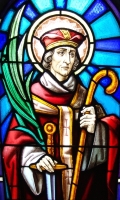
• Leo of Bayonne
• Leo of Carentan
• Leon, Leone
Raised in a pious family. Bishop of Rouen, France. Evangelist in Navarre and the Basque regions. Martyred by Saracen pirates. Legend says that a spring of water sprang up where he died, and that his body carried his severed head back to the place of his last sermon before finally collapsing.
c.856 at Carentan, Normandy, France
beheaded c.900 near Bayonne, France
Bayonne, France
bishop holding his severed head in his hands
https://catholicsaints.info/saint-leo-of-rouen/
Married layman father of a large family; his wife was a member of the Roman senatorial Paladii family. His reputation for personal holiness led local bishops, led by Sidonius Apollinaris of Clermont, to choose him as bishop of Bourges, France c.470. Defended the Church against Arian Visigoths and attempts to weaken the Church by lay officials, a confrontation that was raging in the region at the time of his election. After years of his leadership bringing people back to orthodox Christianity, which led to civil authorities exiling Aryan leaders, Aryans captured, imprisoned and executed Simplicius. Martyr.
1 March 477 in Clermont, France
https://catholicsaints.info/saint-simplicius-of-bourges/

• Eudocia of Samaria
• Eudocia the Samaritan
• Eudokia, Eudoxia, Eudossia
Courtesan who led a disolute youth. She converted, and led a life of great penance to make up for her early waywardness. Martyred in the persecutions of Trajan.
• at Heliopolis in Coele-Syria
• her family was originally from Samaria
beheaded in the 2nd century
https://catholicsaints.info/saint-eudocia-of-heliopolis/
Aladius, Albaudius, Albin, Aubin
Priest. Friend of Saint Aprus of Toul. Bishop of Toul, Gallia Belgica (in modern France) in 507. For centuries, pilgrims to his relics received some of the vintage de Saint Albaud, a wine made at the monastery that received a blessing for its use in healing of pilgrims.
late 5th century Gaul (in modern France)
• c.525 in Toul, France of natural causes
• buried in the Saint-Aper Benedictine abbey church in Toul next to Saint Aprus
• relics enshrined in the mid-9th century
https://catholicsaints.info/saint-albaud-of-toul/
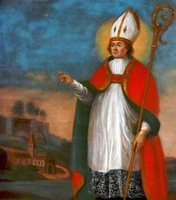
Amantius, Amant, Amand
Rather than go into business as his family wanted, Amand decided to take up arms against the Saracens. Setting sail for the front lines, his ship was blown back to show, and Amand took this as a sign that he should not be a soldier. He gave away all his possessions, became a hermit, then a monk, and then founder and first abbot of what became Saint Amand-de-Boixe monstery.
https://catholicsaints.info/saint-amandus-of-boixe/
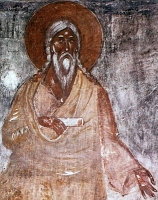
Old Testament patriarch. Third son of Adam and Eve, and the eldest son at home after the death of Abel by Cain. Lived to age 912.
While nothing else is known about him from Biblical sources, Jewish tradition says that Adam and Eve taught Seth the secret to resisting evil: when temptations began, he immediately went into fervent prayer; if the temptation was great, he would flee to an altar and as for God's support.
https://catholicsaints.info/seth-the-patriarch/
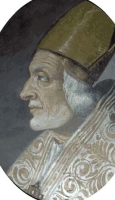
Albin, Albino
Bishop of Vercelli, Italy in 452, he took over a diocese in turmoil and ruins, and spent the rest of his life working to put it back in working order. Built a new cathedral over the ruins of the old one, and the tomb of Saint Teofrasto.
Pella, Italy
https://catholicsaints.info/saint-albinus-of-vercelli/

5 January (Orthodox calendar)
Consecrated virgin who lived in a shed, leaving only to attend Mass. She devoted her life to prayer and to caring for travellers. Known for keeping her face covered at all times and refusing to look at the faces of others.
c.460 of natural causes
https://catholicsaints.info/saint-domnina-of-syria/
A group of Christians martyred together, buried together, and whose relics were transferred and enshrined together. We know nothing else but their names - Benignus, Donatus, Felician, Fidelis, Filemon, Herculanus, Julius, Justus, Maximus, Pelagius, Pius, Primus, Procopius and Silvius.
• 2nd century Rome, Italy
• buried in the Saint Callistus catacombs in Rome
• relics enshrined in the Jesuit church in Antwerp, Belgium on 28 February 1600
https://catholicsaints.info/martyrs-of-antwerp/
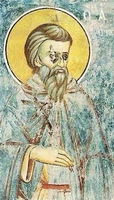
16th-century monk at the Vatopedi monastery. Hermit on Mount Athos. Captured by Turkish pirates, he was sold into slavery where he was chained and put to hard labour. Finally freed, he resumed his religious life first at Vatopedi, and then as a hermit on Mount Athos.
https://catholicsaints.info/blessed-agapios-of-vatopedi/
Orso, Ours, Ursinus
Bishop of Toul, Gallia Belgica (in modern France) c.490. Assigned Saint Vaast of Arras to bring Clovis I, king of the Salian Franks, to Christianity.
Frankish
• c.500 in Toul, France
• buried in the cemetery of Saint-Mansuy
• relics enshrined in the church of Saint-Mansuy de Fontenoy-le-Château in 1026
https://catholicsaints.info/saint-ursus-of-toul/
Bonavita the Blacksmith
Layman blacksmith, wheelwright and locksmith. Franciscan tertiary. Known for his deep prayer life and charitable works.
1375 in Lugo, Italy of natural causes
https://catholicsaints.info/blessed-bonavita-of-lugo/
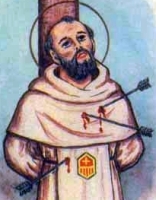
Mercedarian. Had the gift of tongues, which he used to preach to Saracens and convert many of them to Christianity. Tortured with hot tongs and martyred for his work.
tied to a pole and shot with arrows on the road in Almeria, Spain
https://catholicsaints.info/blessed-pietro-ernandez/
Born to the nobility. After the death of her father and brothers, Aurelia inherited the family estates and was besieged by offers of marriage. On the advise of her spiritual teacher, Blessed Otto of Cappenberg, she turned the family castle into a Premonstratensian convent from 1134 to 1148.
12th century Germany
https://catholicsaints.info/blessed-aurelia-of-wirberg/
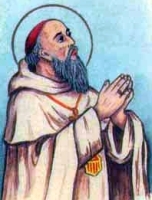
Gonzalo of Granada
Priest. Auxiliary bishop of Granada, Spain. Mercedarian Commander. Moved his house to Granada c.1500 and build a church and convent there.
1538 in Granada, Spain of natural causes
https://catholicsaints.info/blessed-gonzalo-de-ubeda/
Two martyrs who died in Rome, Italy, and whose relics were transferred to and enshrined in Cologne, Germany in 1645. We know nothing else about them.
https://catholicsaints.info/saint-constantius-of-cologne/
https://catholicsaints.info/saint-faustus-of-cologne/
A group of 260 Christians who, for their faith, were condemned to road work on the Salarian Way in Rome, Italy during the persecutions of Claudius II. When they were no longer needed for work, they were publicly murdered in the amphitheatre. Martyrs.
shot with arrows in 269 in Rome, Italy
https://catholicsaints.info/martyrs-of-the-salarian-way/
Loubert, Luperc, Lupercio, Lupercius, Luperculus
Evangelizing second bishop of Eauze, France, converting many. Martyred by Dacian the governor during the pesecutions of Decius. Highly venerated in Tarbes, France; the old cathedral in Eauze was dedicated to him.
probably in Spain
3rd century
https://catholicsaints.info/saint-lupercus/
Monk at Saint Andrew's abbey. Spiritual student of Saint Adrian, bishop of Saint Andrew's. Missionary to the Isle of May in the Firth of Forth area in Scotland. Missionary to Fife, Scotland. Murdered with a group of Christians by Danish raiders.
murdered in 874 in the area of the Firth of Forth, Scotland
https://catholicsaints.info/saint-monan/
Born to the nobility, the family of the counts of San Giorgio Canavese. Noted for his devotion to the Blessed Virgin Mary.
Italy
• 1483 of natural causes
• buried in the parish church of San Giorgio Canavese, Italy
https://catholicsaints.info/blessed-george-biandrate/
Antonina of Nicomedia
Tortured and martyred for refusing to sacrifice to pagan gods.
sewn up in a sack and thrown into a pond to drown c.306 at Nicaea, Bithynia (in modern Turkey)
https://catholicsaints.info/saint-antonina-of-bithynia/
A group of 13 Christians executed together for their faith in Africa. The only details about them to survive are ten names - Abundantius, Adrastus, Agapius, Charisius, Donatilla, Donatus, Fortunus, Leo, Nicephorus and Polocronius.
https://catholicsaints.info/martyrs-of-africa-1-march/
Siviardus, Siviardo
Monk at Saint-Calais Abbey on the River Anisole in France where his father served as abbot. He served as abbot himself, and wrote a biography of Saint Calais, the founder of the monastery.
c.729
https://catholicsaints.info/saint-siviard/
Bishop of Marseilles, France in 716. He and his flock suffered from attacks by Saracens who had been brought in by Duke Mauront to combat the forces of Charles Martel.
c.738
https://catholicsaints.info/saint-abdalong-of-marseilles/
A large but unspecified number of Christians martyred in the persecutions of Emperor Alexander Severus and the praefect Ulpian who saw any non-state religion to be a dangerous treason.
219
https://catholicsaints.info/martyrs-under-alexander/
Marnan, Marnanus, Marnoc
Spiritual student of Saint Columba an Iona Abbey. Bishop. Kilmarnock, Scotland is named for him.
Ireland
c.625 at Annandale, Scotland
https://catholicsaints.info/saint-marnock/
Maoineann, Moenu, Monendabbis
Sixth century bishop of Clonfert, County Galway, Ireland.
c.571
https://catholicsaints.info/saint-moinnen-of-clonfert/
No certain information about this man has survived, but he is listed in very early martyrologies.
latter 6th-century Ireland
610 of natural causes
https://catholicsaints.info/saint-libren/
Bishop of Embrun, Gaul (in modern France) during the 5th to 7th century (records vary). Much of his time was spent fighting Arianism.
https://catholicsaints.info/saint-albin-of-embrun/
Minim monk. Prior of his house. Martyred by heretics.
1575 in Lunel, France
https://catholicsaints.info/blessed-claudius-gabriel-faber/
Martyr.
430 in Carthage, North Africa (modern Tunis, Tunisia)
https://catholicsaints.info/saint-donatus-of-carthage/
Martyred in the persecution of Maximian Herculeus.
c.290
https://catholicsaints.info/saint-hermes-of-numidia/
Bonus
Third-century bishop. Martyr.
https://catholicsaints.info/saint-bono-of-cagliari/
Martyred in the persecution of Maximian Herculeus.
c.290
https://catholicsaints.info/saint-adrian/
• Our Lady della Croce
• Anna Thienel
• Jonathann the Patriarch
CatholicSaints.Info Portable Edition